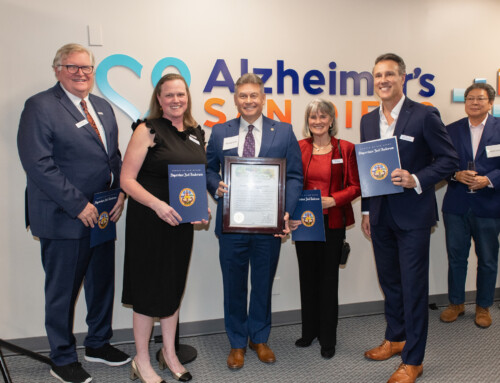
Many individuals with Down syndrome may develop Alzheimer’s later in life. Alzheimer’s disease is a brain disorder affecting memory and thinking skills. It is important to understand the link between these two conditions in order to prepare for the future.
Understanding the Connection Between Down Syndrome & Alzheimer’s Disease
Individuals with Down syndrome (DS) have a higher risk of developing Alzheimer’s disease (AD). This is due to an extra chromosome 21. The gene APP creates amyloid precursor protein, which in turn causes plaques and tau tangles. These plaques and tangles affect brain cells, raising Alzheimer’s risk.
By midlife, usually around 40-50 years old, people with Down syndrome may show signs or symptoms of Alzheimer’s. Diagnosing dementia in this group is challenging. Regular tests might miss cognitive changes in those with Down syndrome. The NTG-EDSD screening tool helps detect dementia earlier in individuals who also have Down syndrome. It works alongside MRI and spinal tap tests. Early detection aids timely intervention and support.
Alzheimer’s Disease Symptoms
The journey to diagnose Alzheimer’s in individuals with Down syndrome can often be challenging. Sometimes, changes in behavior or thinking get misinterpreted. Rather than recognizing Alzheimer’s, they attribute the changes to the pre-existing intellectual disability. This misconception, known as diagnostic overshadowing, poses a significant challenge. People with Down syndrome may also have a more complex medical history, in which case it is important that providers rule out health issues as a cause of cognitive changes. To tackle this issue, healthcare professionals and caregivers must stay alert. It’s crucial for ensuring individuals get the right treatment.
The likelihood of Alzheimer’s rises with age. Keep an eye out for behavioral changes such as:
- Increased confusion
- Short-term memory changes
- Reduction or loss of ability to do familiar activities
- New episodes of wandering or becoming lost in familiar places
Other possible symptoms of Alzheimer’s disease include:
- Seizures that begin in adulthood
- Problems with coordination or walking
- Reduced ability to focus
- Decreased fine motor control
If you notice these or other significant changes, consult a healthcare provider. Not all dementia symptoms stem from Alzheimer’s disease. Medication, depression, kidney, thyroid, or liver issues can also lead to dementia symptoms. Some of these conditions are treatable and reversible.
Down Syndrome & Alzheimer’s Research
Alzheimer’s disease has no cure. Participation in research studies and clinical trials is crucial. It advances our understanding of Alzheimer’s in individuals with Down syndrome. It also tests new interventions to combat cognitive decline and enhance quality of life.
Clinical studies and trials need volunteers to discover new treatments and better understand these conditions. Participating in a clinical trial is a personal choice, and both the participant (if they are able) and their care partners should weigh the risks and benefits before engaging in a trial. Family members and other caregivers play an important role for adults with Down syndrome who participate in clinical research. They may be asked to provide consent or permission for the person with Down syndrome to take part in the study, accompany the person to study visits, and answer health questions about him or her.
Resources
Call us at 858.492.4400 to speak with one of our Dementia Care Coaches who are here to help San Diego County residents and/or those caring for someone living in San Diego County (Spanish speakers available). Also check out our free education classes, social activities, caregiver support groups, & more.
Posted on November 13th, 2025






